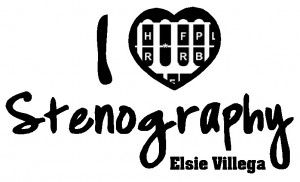 The traditional way of indicating colloquy between attorneys is STPHAO and SKWRAO. These are the designations that I have been taught in school. STPHAO for the plaintiff’s attorney; SKWRAO for the defendant’s attorney. However, after reading “The Deposition Handbook,” I learned of another way to indicate colloquy between attorneys that I think I will implement from now on.
The traditional way of indicating colloquy between attorneys is STPHAO and SKWRAO. These are the designations that I have been taught in school. STPHAO for the plaintiff’s attorney; SKWRAO for the defendant’s attorney. However, after reading “The Deposition Handbook,” I learned of another way to indicate colloquy between attorneys that I think I will implement from now on.
The book suggests writing STPHAO for the attorney on your left and EUFPLT for the attorney on your right, during colloquy. I find this helpful because it is easier for me to type along with the visual. This eliminates hesitation for me. This technique also makes it easier for me to deal with designations for multiple speakers.
*UPDATE*
My twitter friend @CaptionBabe, came up with a genius alternative to using EUFPLT as a colloquy designation. Her alternative won’t conflict with the use of EUFPLT as, “I.”
Her suggestion was to add a final -D do EUFPLT when using that stroke as a colloquy designation. I tried it out and @CaptionBabe’s alternative flows perfectly. It’s not a difficult, or awkward stroke at all. I will definitely be implementing her suggestion into my writing.
SPECIAL THAKS TO: @CAPTIONBABE (on Twitter).
 The Merriam-Webster Dictionary defines bilirubin as “a reddish-yellow water insoluble pigment occurring especially in bile and blood causing jaundice if accumulated in excess.”
The Merriam-Webster Dictionary defines bilirubin as “a reddish-yellow water insoluble pigment occurring especially in bile and blood causing jaundice if accumulated in excess.”






